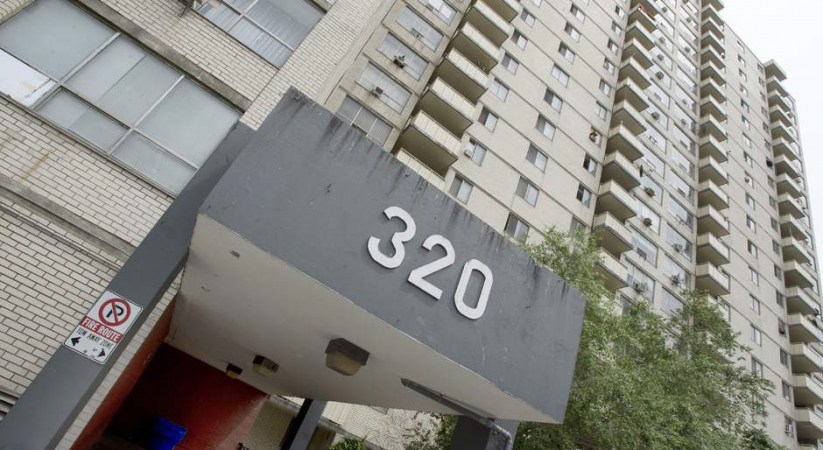
Toronto | June 9, 2016 – VICE documentary about alleged gang Dixon City Bloods unfairly smears reputation of people living in north Etobicoke neighbourhood
Is there a gang operating out of several condo towers in northwest Toronto called the Dixon City Bloods? The truth is that it doesn’t really matter. The Toronto police think the gang exists, and have used its alleged existence as an excuse to criminalize and harass the greater community, especially its large population of residents of Somali heritage.
Guilt-by-association police scrutiny of black and Muslim people is sadly nothing new in Toronto. Sometimes our media attempts to expose the prejudicial treatment but most reporting — through laziness, sensationalism, and ingrained ignorance — simply reinforces anti-black racism.
The creators of a new VICE documentary recklessly entitled “This is Dixon” claim they wanted to find out if Dixon is really home to a gang. But their work amounts to a fool’s errand, a misguided mission to answer irrelevant question that has further demonized Dixon’s Somali community.
The film’s begins with narrator Suroosh Alvi telling viewers he spent his summers as a teenager living in Dixon. “Back then,” Alvi explains, “it was home to middle class South Asians, Jamaicans and white Canadians. The kids from the different buildings would hang out, we played some tennis, and looking back, I have some pretty fond memories of my time spent there.”
Alvi then says he was surprised by more recent media reports describing Dixon as the “breeding ground for a violent gang” known as the Dixon City Bloods. The narrator immediately adds that Somalis fleeing civil war began and settling in Dixon during his time there. Two minutes into the half-hour documentary, the filmmakers have established a racist narrative linking the arrival of Somali immigrants with crime and violence.
Throughout the rest of the documentary, producer and director Allya Davidson takes viewers on a bizarre and convoluted tour featuring Dixon’s residents of Somali heritage. Nearly all residents in the film say they know nothing about a gang called the Dixon City Bloods, or that they don’t attribute local crime to an organized group. The film contrasts resident interviews with conversations with Toronto police, specifically 31 Division superintendent Ron Taverner, who insists the Bloods exist.
“This is Dixon” places Somali residents in the unfair and dangerous position of exposing organized criminal activity taking place in their neighbourhood. I wonder if filmmakers expected residents to say, “yes there’s a gang, let us tell you who they are, where they live, and how they operate,” without any concern for their own safety, or the reputation of their community, or even more racist police profiling.
By repeatedly asking residents of Somali heritage questions about gangs they cannot answer — because they do not know, or because they rightfully fear being held responsible for crime — the documentary puts an unfair and racist burden on the community. Calling such a piece “This is Dixon” incorrectly defines the neighbourhood by the crimes of a small fraction of residents.
The film acknowledges local police seem to disproportionately label people of Somali heritage with gang affiliation. Alvi explains that even though people of different ethnicities were arrested in the “Project Traveller” raids at Dixon, only people with Somali names were charged as gang members. “It’s little surprise they feel unfairly targeted,” says the narrator. Yet the film itself almost exclusively focuses on Somalis, as if they alone can answer the gang question.
The documentary’s marketing reveals its sensational and misguided quest. A post on VICE’s Facebook page promises “A doc about the alleged Toronto gang linked to former-mayor Rob Ford.” Yet, unlike the Somali community, Ford, his family, friends, staff, associates and local community are a minor note in the story. A preview of the film includes a line from Toronto Sunreporter Sam Pazzano saying, “the people who live in the community either don’t know, or they want to be in denial.” By entertaining the possibility that Somalis in Dixon are hiding something from police, the film plays to the same racist and Islamophobic attitudes that already haunt the community.
The film concludes with a final, solemn statement from the narrator, who repeats that police and residents differ on the gang’s existence. “After everyone we met and all of the opinions that we heard, we still can’t say for sure which side is right.” The Somali residents of Dixon are not a “side” in an irrelevant debate about the existence of gangs. They are good Torontonians who become scapegoated so the media and public can continue telling racist and simplistic narratives about crime.
.
.
Desmond Cole is a Toronto-based journalist. His column appears every second Thursday.
Originally Posted on The Star
________________________
_____________________________________________________________________________________
Xafiiska Wararka Qaranimo Online | Mogadishu, Somalia
_____________________________________________________________________________________Advertisement
_____________________________________________________________________________________







